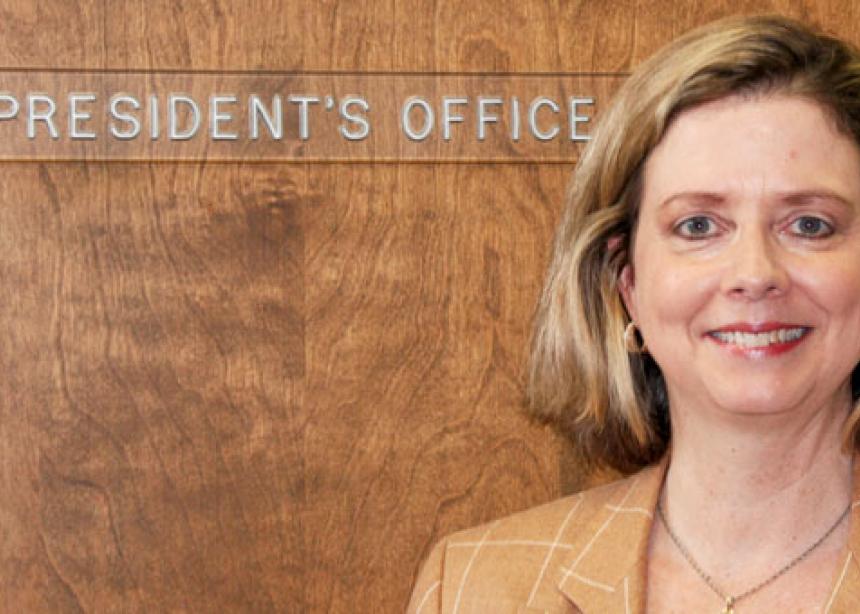As Susan Schultz Huxman settles into her role as president of Conrad Grebel University College, the school of Mennonite Church Eastern Canada at the University of Waterloo, Ont., Canadian Mennonite settled in for a conversation about her and the university college.
CM: We know that you have roots in Kitchener-Waterloo, but have spent many years south of the border. Tell us something of your background/history.
Huxman: My grandfather, H.H. Schultz, was a Baptist minister and radio preacher in southern Ontario. My father was in the first graduating class at Rockway [Mennonite Collegiate]. His best friend at Rockway went to Goshen [College, Ind.], so he went there, where he met my mother, a Swiss Mennonite from Holmes County, Ohio, and the rest is history.
My father served as president of Bethel College, Kan., for 20 years. I’m a graduate of Bethel. I met my husband there. Went on to University of Kansas to do my master’s and doctorate in communications studies. My doctoral dissertation was on rhetoric of dissent. I focused on the Mennonites in World War I and how Mennonites responded to conscription.
My grandfather was a co-founder of Chesley Lake [a Mennonite camp near Lake Huron] and we would bring up my aunts and uncles and cousins from Holmes County. My memories of Canada are of that place, that spiritual context.
CM: With Grebel’s successful innovation of locating itself as a Mennonite institution on the edge of a major provincial university, how does it motivate graduates to serve the Mennonite church in their career choices, rather than having all of them swept into the cultural mainstream?
Huxman: Leadership development is one of Grebel’s core values. We’re already doing that, gradating people from the master of theological studies, the first of two graduate programs. We’re in the last stages of developing a PACS [peace and conflict studies] graduate program.
A good deal of research shows that students who go to schools like Grebel are more likely to stay in their church and assume positions of leadership. We’re recruiting students, getting [them] immersed in a faith-formation culture can do impor-tant things in leadership formation.
CM: In coming to Grebel, what goals have you and the board focused on for your first three-year term as president?
Huxman: This place is extraordinarily healthy academically, spiritually, financially, so really my mandate is to manage that growth. Going back to my background in communication, my special gifts are to find ways to shine our light a little brighter in a variety of places for new stakeholders.
CM: Henry Paetkau noted in his farewell interview with Canadian Mennonite that Grebel’s Anabaptist Studies Department is one of its best-kept secrets. How will Grebel inform both Anabaptist and non-Anabaptist students of Anabaptist faith and practice?
Huxman: Part of the Next Chapter Campaign is to triple the size of the archives and library, not just in terms of building space, but of program space for Mennonite studies, PACS, master of theological studies, music studies. Even if they’re not here for Mennonite studies, if they’re here for music, they can’t help but be influenced.
And then the new front entrance [is] a new way of telling the Mennonite story.
CM: Is the role of the president changing for church-related universities like Grebel, and, if so, how?
Huxman: It’s always changing. Good college presidents are looking ahead, being on the cusp of change. What a student is, is changing. Delivery of courses has to be a diversified portfolio. If you ask what a Grebel student is, the answer is quite long: residents, associates, graduate students, distance learners, certificate students, and over 2,000 who come “across the creek” from the University of Waterloo.
CM: Will the faculty continue to be mainly Mennonite or will you bring in professors-in-residence to add an ecumenical approach to teaching? If so, who might those other-than-Mennonite professionals be?
Huxman: We are poised to be replacing quite a few faculty in the next few years. Hiring depends on the nature of the po-sition. Finalists for a position will be asked the same set of questions of “how you will be building on and contributing to our mission to ‘seek wisdom, nurture faith, and pursue justice and peace in service to church and society.’ ” We would need to have answers that this person could shoulder the load of carrying out this mission.



Add new comment
Canadian Mennonite invites comments and encourages constructive discussion about our content. Actual full names (first and last) are required. Comments are moderated and may be edited. They will not appear online until approved and will be posted during business hours. Some comments may be reproduced in print.